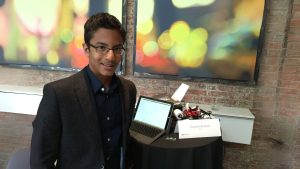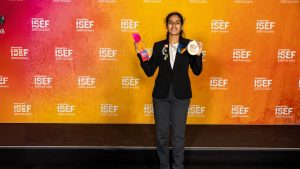(June 5, 2025) In the cold February of 2021, Texas was hit by a series of brutal winter storms that brought the state to a standstill, causing the biggest energy failure in its history. Millions were left scrambling for essentials as power grids collapsed, leading to shortages of water, food, and heat. Among the affected was 13-year-old Arya Gurumukhi, who found herself huddled with her family in an unheated apartment for over a week. Trapped in the cold, with no light or warmth, Arya experienced firsthand the devastating impact of energy insecurity, sparking a deep interest in alternative energy solutions. Determined to find a solution, Arya began exploring how science could address real-world challenges — a journey that led her to the Bionic Leaf, a solar-powered device that mimics photosynthesis to generate fuel. She went a step further, developing a new catalyst to enhance its efficiency and output. Her innovative work won her the 2024 Gloria Barron Prize for Young Heroes. “I remember being in complete disbelief for a few seconds and being overjoyed. It wasn’t just about me winning at the end of the day, it was about my work and research being seen,” she tells Global Indian.
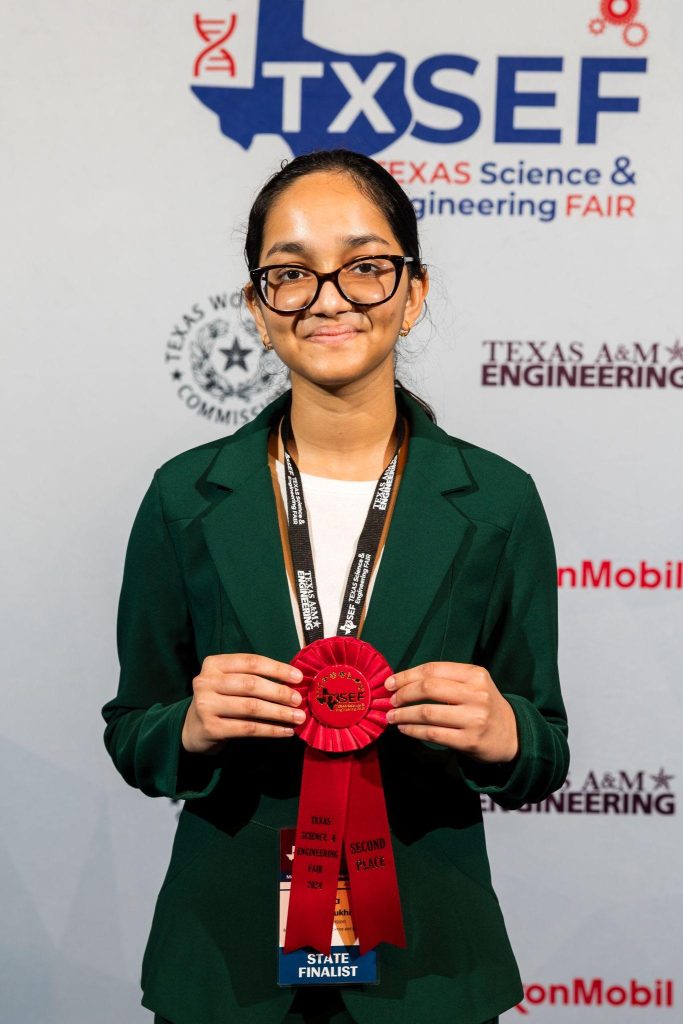
Arya Gurumukhi
For the teenager, the recognition is a validation that her work is significant. “Sometimes STEM can feel very cold or purely technical, but my journey has always been about bridging science with lived experience. Being recognised made me feel like this intersection I’ve been working towards between research and real-world impact is finally being achieved. It reminded me that young people can be both engineers and advocates and also gave me the confidence to continue my efforts within the Bionic Leaf as it’s creating a significant impact on individuals’ lives.”
From DIY experiments to real-world energy solutions
Growing up as a curious child who was exposed to books and educational TV, Arya often found herself creating mini-DIY projects in her home kitchen. “Whether that be creating a lemon battery or even just creating a mini volcano with baking soda,” she recalls. “I also loved to build new architectural pieces and mechanisms with Legos,” says the girl whose curiosity led her to dive deep into the world of STEM.
Her interest grew stronger after the 2021 power outage in Texas, when the issue became personal and she began researching energy storage mechanisms and energy systems. “More than 940 million people across the world don’t have access to a stable, secure, and efficient power source, and unfortunately, the number doesn’t seem to be going down anytime soon. I knew that a solution had to be created, and I started looking into alternative energy systems and discovered biology-inspired energy storage mechanisms.” For Arya, tackling energy insecurity isn’t just a project — it’s a mission fuelled by purpose and urgency.
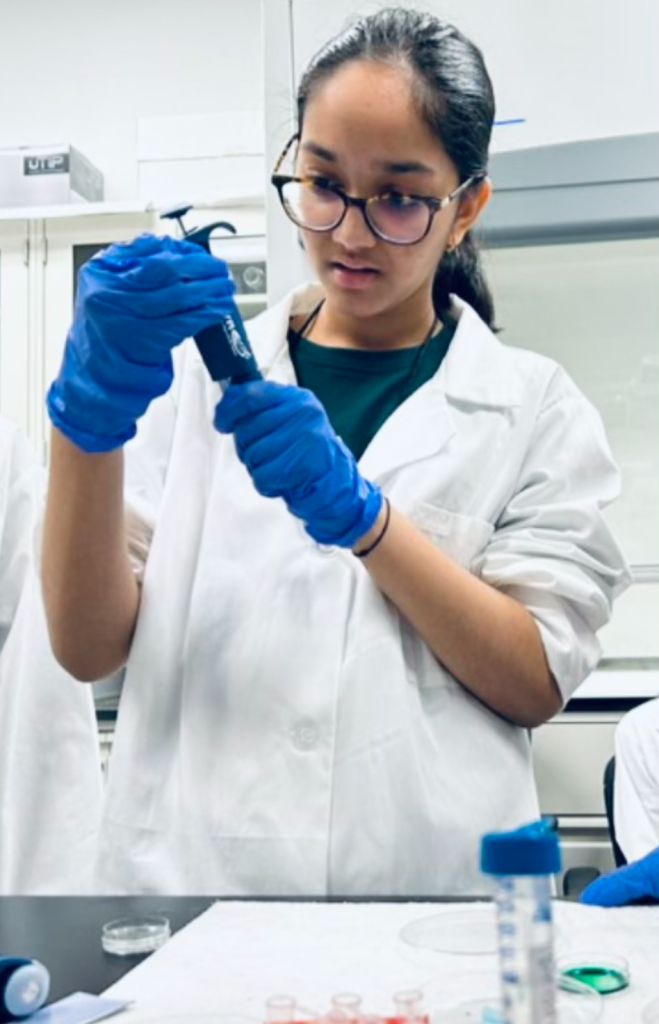

While the Texas power outage ignited her curiosity, it was a visit to her grandmother’s village in India that truly opened Arya’s eyes to the global scale of the energy crisis. There, she witnessed firsthand how intense summer heat and frequent power cuts—driven by overwhelming demand—left communities vulnerable. “I realised that several people in hospitals, homes, and communities depended on electricity either to stay cool or warm, simply didn’t have it,” she says. This lack of access to energy wasn’t just inconvenient but was also life-threatening. “The energy insecurity problem is further exacerbated in low-income communities and only continues to get worse with time. This made me realize that I would need to be the one who needed to step up and change our current energy sources,” explains the Plano East High School student.
Turning sunlight into fuel with the Bionic Leaf
The inspiration for the sustainable energy resource, which could reduce our dependence on fossil fuels, came in the most unexpected place – her own backyard. Surrounded by nature, she had a quiet moment of clarity. “It really was one of those moments where everything just clicked. I looked up, and sunlight was filtering through the leaves of a tree. It was quiet, and that’s when it hit me: plants have already figured out the most efficient, sustainable way to create energy, photosynthesis.” That simple observation led to a powerful idea. “Why can’t we take inspiration from nature and replicate that same process in the lab?’ That moment sparked the idea of the Bionic Leaf,” says Arya, who began exploring catalysts, sustainable materials, and ways to create a fuel that could mimic nature’s process and serve humanity’s growing energy needs.
Explaining how Bionic Leaf works, she says, “It tries to emulate photosynthesis to make a sustainable fuel source by obtaining solar energy using a photovoltaic cell, which generates a current that flows to two catalysts placed in water. These catalysts produce hydrogen, which then serves as food or fuel for a specific type of bacteria. The bacteria consume the hydrogen and, in turn, generate fuel. My focus was on improving the efficiency of the catalysts to maximize fuel production.”
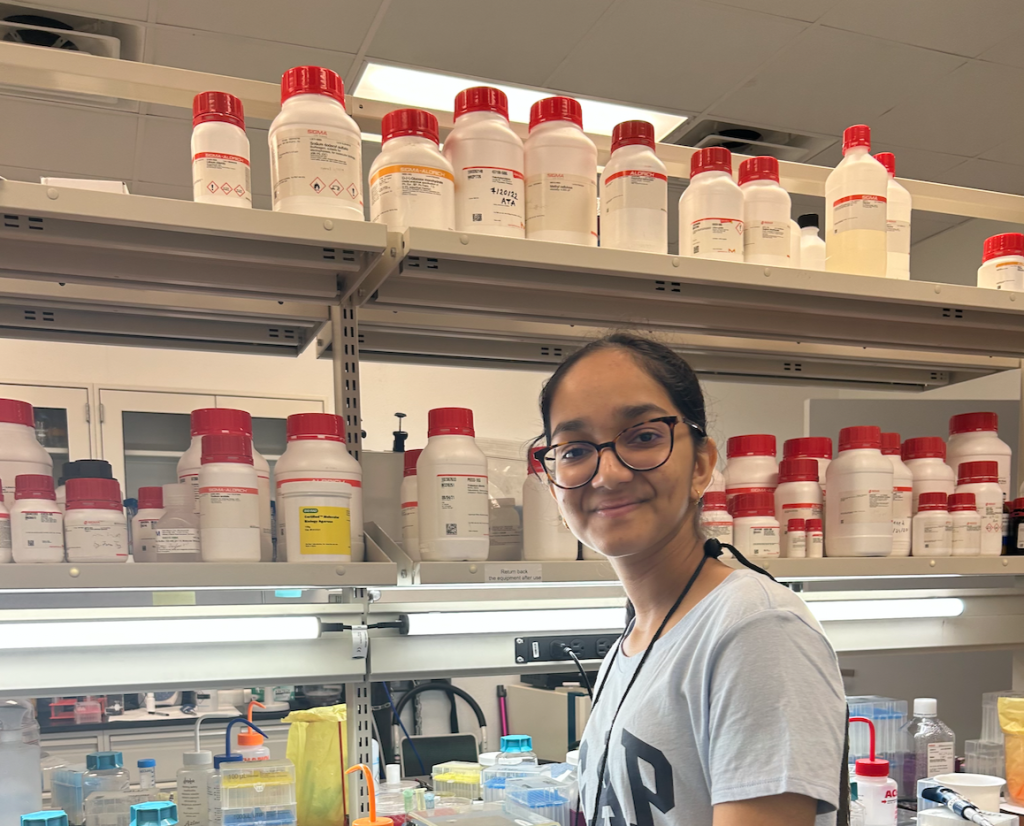

Late nights, setbacks, and a test tube of triumph
But the journey was far from easy for Arya who had to battle moments of self doubt, face setbacks, long nights of research while bringing her prototype to life. “One of the biggest challenges was getting the catalyst to sustain a reaction long enough to produce viable fuel,” she says. “I’d stay up late reading journal articles, tweaking metal oxide ratios, and rerunning electrolysis over and over, only to get a few drops of fuel, or nothing at all.”
There were times she wondered if the idea would ever work. But what kept her going was the bigger picture. “I wasn’t doing this for a project, but for communities in rural India where the lights flicker on and off, and energy isn’t a guarantee. “Every time I felt like giving up, I thought of them. And eventually, something shifted. The numbers finally worked, the reaction sustained, and I held a test tube of fuel in my hand that came from sunlight, water, and a catalyst I built. That moment made every failure worth it,” she adds.
From lab to lives: powering change in South Sudan
Arya’s invention has already made a real-world impact — the Bionic Leaf is being used in over 15 communities in South Sudan, thanks to partnerships with NGOs. For the Texas teen, seeing her work move beyond the lab and into the lives of people who truly need it has been nothing short of surreal. “Seeing the Bionic Leaf become more than just an experiment, seeing it work in a place where people need it most, reminded me why I started. It was humbling, emotional, and empowering all at once,” says Arya, who is keen on scaling the impact. “I’d love to partner with clean tech accelerators, local governments, and organisations focused on energy equity. Scaling the Bionic Leaf means not just building a stronger prototype but creating real infrastructure to support implementation, especially in underserved areas.”
Her goal is to partner with large manufacturers for wider distribution in low-income areas, while also working with universities and environmental justice groups to explore new materials and design upgrades that could make the technology even more effective and accessible. Arya, who has plans of pursuing materials science and policy academically in the future, is working on refining the catalyst for even greater fuel output and longer stability.
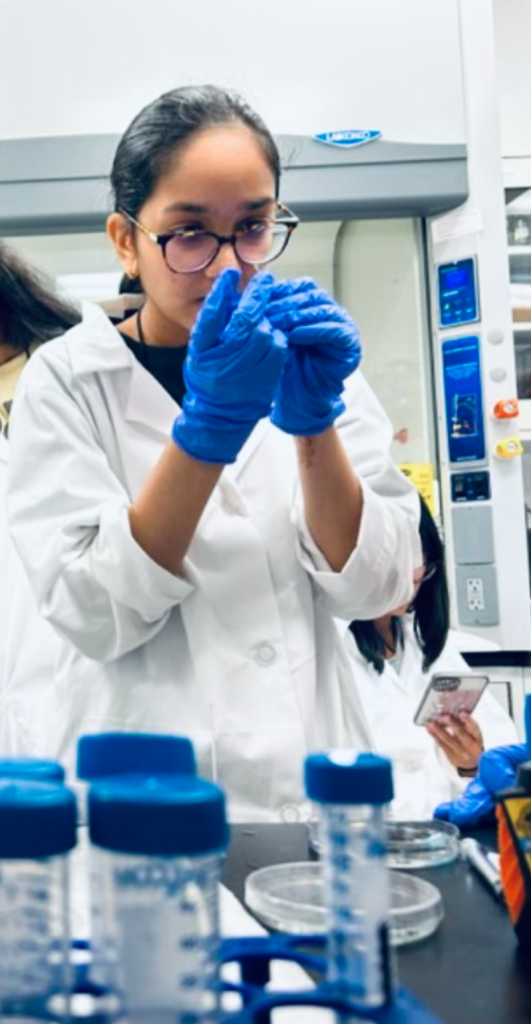

Rooted in heritage, driven by purpose
As a young Indian-American in STEM, Arya believes her cultural roots have deeply influenced her approach to science, innovation, and creating social impact. “Visiting my grandma’s village in India, where power outages were constant, gave me first-hand experience of what energy insecurity looks like. My heritage has taught me resilience, resourcefulness, and deep respect for community, values that shape how I approach every challenge. My background not only pushed me further to innovate, but I also always viewed science as a variable experiment rather than having one definitive output.”
Arya’s advice to young innovators is simple yet powerful: find something you are truly passionate about. “It will not only create better results but will also lead to more meaningful change. Innovation begins with caring deeply and being bold enough to act on it.” Winning the Gloria Barron Prize was a milestone, but for Arya, it meant much more than recognition. “It deepened by sense of responsibility. My invention represents communities, hopes, and a bigger fight for sustainable energy. I now see myself not just as an innovator, but as someone with a duty to amplify voices, share knowledge, and lead boldly,” she concludes.
- Follow Arya Gurumukhi on LinkedIn
ALSO READ | Shanya Gill on TIME’s Kid of the Year Honoree List: It’s an honour



